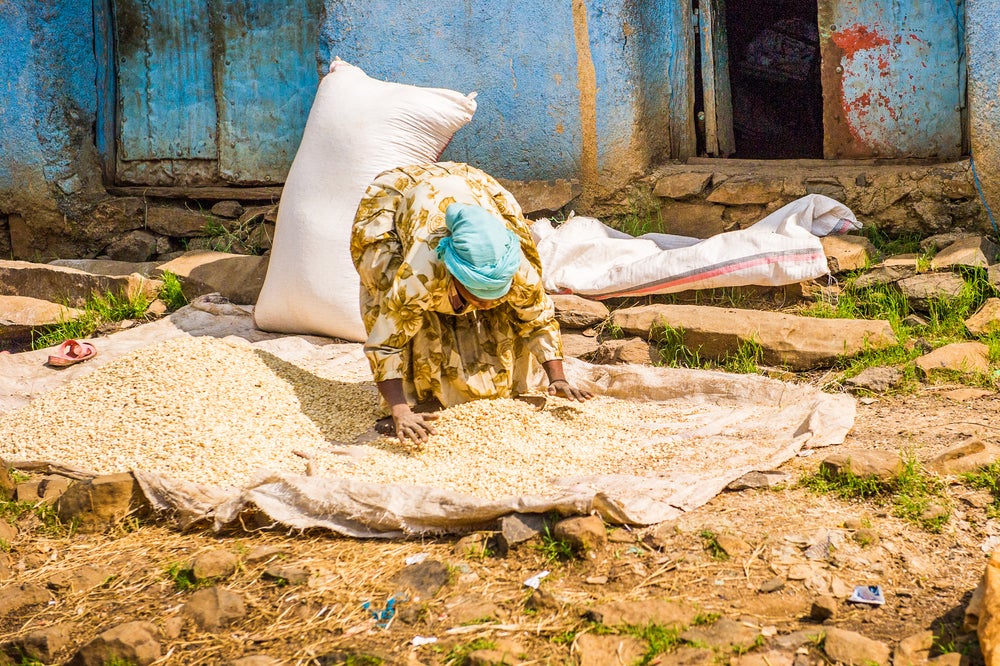 Photo by: Anton_Ivanov/Shutterstock
Photo by: Anton_Ivanov/Shutterstock
As countries navigate the coronavirus (COVID-19) pandemic, policy interventions that address the specific needs of women farmers are critical to mitigate the current economic fallout, accelerate the recovery process in rural areas, and to alleviate existing gender inequalities. Here is some evidence from the African continent of policies and programs that can work.
What’s the problem?
Most of the world’s poor live in rural areas, working mainly in smallholder agriculture. The pandemic threatens to expose—and exacerbate—gender differences in the constraints that farmers face. Such differences leave women particularly vulnerable to the economic storm of COVID-19.
For one, women are already disproportionately responsible for domestic chores and caretaking duties, so they have less time for their farms, compared to men. With the expectation that they will care for out-of-school children or sick relatives, women farmers are more likely to bear the brunt of additional domestic responsibilities.
In addition, women farmers generally have less access to savings and credit than their male counterparts. The pandemic likely also means a sharp drop in remittances, as family members affected by lockdowns and job loss will be unable to send funds home. With less savings to draw upon, women will be unable to weather income losses from effects of the virus, and will likely struggle to buy the seeds and fertilizers needed for the next planting season.
The pandemic also exposes gender differences in land rights. Women who become widowed due to COVID-19 risk disinheritance, as women’s property rights are often conditional on marriage. Furthermore, migrant family members unable to find jobs in urban areas may return to their villages, creating greater competition over land. These dynamics will put women’s already fragile land tenure security to the test, risking widening of the gender gap in investments, productivity, and incomes.
What can we do?
A growing body of evidence demonstrates the power of interventions designed for and targeted to women farmers that can help protect their lives and livelihoods in the context of the COVID-19 pandemic.
Directly providing inputs to women farmers can encourage investment and boost food security. When researchers distributed free fertilizer in Mali, women began to invest more even in other productive components, like herbicides and hired labor, improving their harvests. And in Uganda, preliminary results from the Africa Gender Innovation Lab (GIL) show that providing farmers with subsidized sweet potato vines led to more households growing and consuming the nutritious crop—an especially encouraging result at a time where the coronavirus is threatening food security and household nutrition. To minimize the spread of the virus in rural communities, local networks of female farmers can aggregate their demand, and potentially serve as collection and distribution points for input delivery.
Harnessing the power of mobile technology for trainings can also be effective to address barriers that women farmers face, while reducing physical contact. A new study in Uganda finds that targeting women farmers with a short video of inspirational stories from successful farmers had a variety of effects: the women learned more agricultural practices and adopted them—and sold more of their products on the market. Videos can also be used to engage men on key issues: showing male farmers a persuasive video about the benefits of better land rights for women led to them being much more likely to co-title their land with their wife.
Two new World Bank studies highlight the impact of innovations for standard agricultural extension programs to make them more useful for women. Preliminary results from Mozambique show that adding modules on psychology-based “personal initiative training,” that emphasizes perseverance and problem-solving, to traditional extension services leads to increases in women’s investment in inputs, adoption of best farming practices, cultivation of cash crops, and creation of off-farm businesses. And in Cote d’Ivoire, simply asking couples to jointly prepare a two-year action plan for the management of their farms was found to raise women’s sway over key farming decisions—including their inclusion in management of cash crops.
Cash grant programs for women can help them weather the crisis and accelerate the recovery process. In Mali, providing cash grants to women was found to led to more land being cultivated, greater investment in fertilizer and other inputs, and improved harvests and revenues. And in Nigeria, women who received cash transfers were more likely to start businesses and invest in livestock, and their households were more food-secure. Critically, delivering large cash transfers, less frequently—compared to smaller, more frequent ones—yielded these same positive impacts, at a lower implementation cost with fewer person-to-person interactions.
Channeling cash transfers through mobile money platforms can promote social distancing, increase women’s privacy and security, and lead to better outcomes. In Niger, mobile payments have been shown to increase women’s influence within the household and improve dietary diversity. More generally, the impact of boosting access to mobile money on financial resilience, labor market outcomes, and consumption is more pronounced for female-headed households.
Across the globe, it has been inspiring to see prior investments in women farmers’ empowerment have begun to pay off—and that the measures have enabled women farmers to contribute to the fight against COVID-19. Trainings for small-scale women farmers in Afghanistan in “kitchen gardens” have helped women become food producers. Networks of women farmers in the Pacific Islands have been tapped to help establish basic health checks in their communities and cultivate climate-smart agriculture. In Cote d’Ivoire, women farmers—briefed on COVID-19 health and safety measures—have been able to aggregate their crops and produce food for school meals programs. Investing in measures that can better reach women farmers has widespread impacts—for their wellbeing, and that of their communities.




Join the Conversation